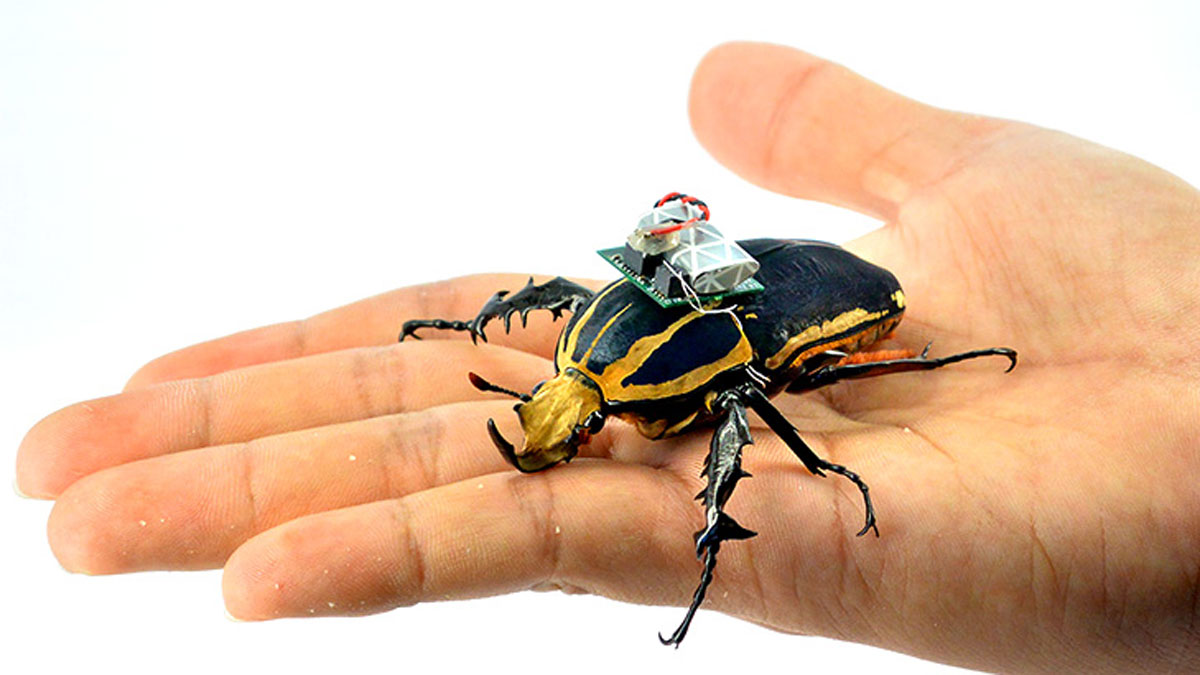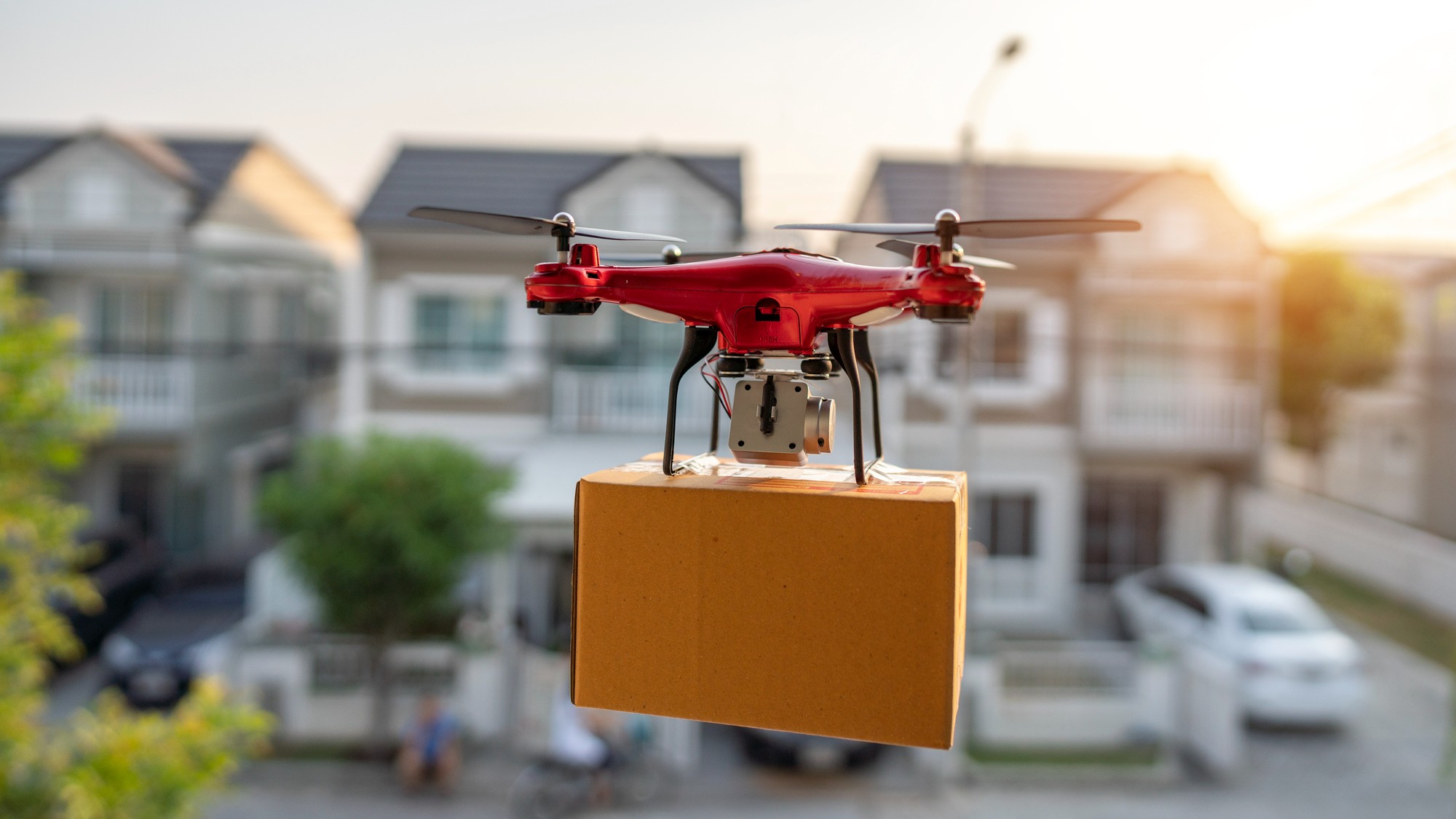Forget drones, giant cyborg beetles are the future
Scientists create digital 'backpacks' to control insects' speed and direction through the skies

A free daily email with the biggest news stories of the day – and the best features from TheWeek.com
You are now subscribed
Your newsletter sign-up was successful
Giant cyborg beetles could one day be winging their way through the skies instead of mechanical drones, scientists say.
The living insects would be controlled by a digital "backpack" that could carry out some of applications currently undertaken by unmanned flying machines.
A team from Singapore and California has successfully controlled the flight of large flower beetle using electrical impulses directed at the animals' muscles, says the Daily Telegraph.
The Week
Escape your echo chamber. Get the facts behind the news, plus analysis from multiple perspectives.

Sign up for The Week's Free Newsletters
From our morning news briefing to a weekly Good News Newsletter, get the best of The Week delivered directly to your inbox.
From our morning news briefing to a weekly Good News Newsletter, get the best of The Week delivered directly to your inbox.
Labs across the world are already trying to develop "artificial insects" which could be used for tasks such as searching for earthquake victims in piles of rubble. The new research suggests using actual insects might be cheaper.
Engineers from Nanyang Technological University in Singapore and the University of California Berkley chose to work with the giant flower beetle, Mecynorrhina torquata, because of its great size and strength.
The microchip backpack was attached using beeswax, which would not harm the animals, and the team stresses that all of the beetles trialled have gone on to live for their natural lifespan of five to six months.[[{"type":"media","view_mode":"content_original","fid":"92880","attributes":{"class":"media-image"}}]]
The beetles were fitted with electrodes on their legs, optic lobes and flight muscles. A radio signal then directed the animal to walk at a specific speed, take off, turn left or right and even hover in mid-air.
A free daily email with the biggest news stories of the day – and the best features from TheWeek.com
At the moment, the chip is powered with a lithium battery which lasts for around a day, but it should be possible to use solar power in the future or even energy "scavenged from ambient radio waves", says project leader Hirotaka Sato.
The advantages of a living beetle over a mechanical one are said to include cost-effectiveness, with each backpack costing around £5, and ease of use - the beetle only has to be told which way to go and how fast, it does the rest itself.
So far, the insects have only flown within a closed room but the team plans to switch to outdoor trials next.
-
 Corruption: The spy sheikh and the president
Corruption: The spy sheikh and the presidentFeature Trump is at the center of another scandal
-
 Putin’s shadow war
Putin’s shadow warFeature The Kremlin is waging a campaign of sabotage and subversion against Ukraine’s allies in the West
-
 Media: Why did Bezos gut ‘The Washington Post’?
Media: Why did Bezos gut ‘The Washington Post’?Feature Possibilities include to curry favor with Trump or to try to end financial losses
-
 Claws, motherships and shotguns are just some of the latest drone technology
Claws, motherships and shotguns are just some of the latest drone technologyThe Explainer Beyond just surveillance, drones can now be used for a wide array of purposes
-
 The pros and cons of drone delivery
The pros and cons of drone deliveryPros and cons It's a bird! It's a plane! It's a ... drone?
-
 How cybercriminals are hacking into the heart of the US economy
How cybercriminals are hacking into the heart of the US economySpeed Read Ransomware attacks have become a global epidemic, with more than $18.6bn paid in ransoms in 2020
-
 Language-learning apps speak the right lingo for UK subscribers
Language-learning apps speak the right lingo for UK subscribersSpeed Read Locked-down Brits turn to online lessons as a new hobby and way to upskill
-
 Brexit-hobbled Britain ‘still tech powerhouse of Europe’
Brexit-hobbled Britain ‘still tech powerhouse of Europe’Speed Read New research shows that UK start-ups have won more funding than France and Germany combined over past year
-
 Playing Cupid during Covid: Tinder reveals Britain’s top chat-up lines of the year
Playing Cupid during Covid: Tinder reveals Britain’s top chat-up lines of the yearSpeed Read Prince Harry, Meghan Markle and Dominic Cummings among most talked-about celebs on the dating app
-
 Brits sending one less email a day would cut carbon emissions by 16,000 tonnes
Brits sending one less email a day would cut carbon emissions by 16,000 tonnesSpeed Read UK research suggests unnecessary online chatter increases climate change
-
 Reach for the Moon: Nokia and Nasa to build 4G lunar network
Reach for the Moon: Nokia and Nasa to build 4G lunar networkSpeed Read Deal is part of the US space agency’s plan to establish human settlements on the lunar surface